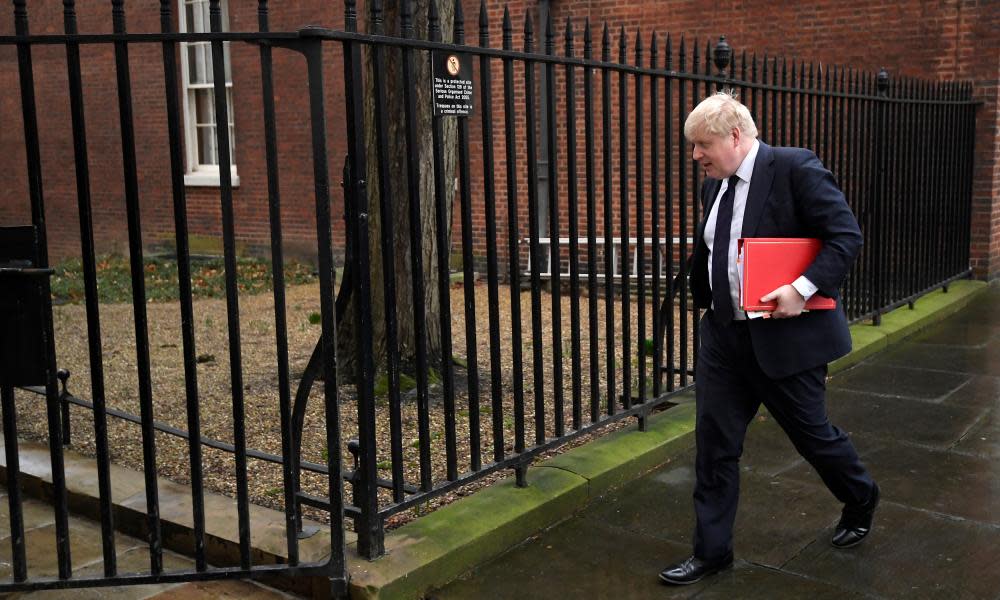The Guardian view on NHS funding: no platform for Boris Johnson

The foreign secretary, Boris Johnson, has been parading in the headlines for a week now, mostly on matters that are no part of his departmental brief. In the 24 hours before today’s cabinet meeting, he and his allies were briefing that he would demand an extra £5bn a year for the NHS. It did not go to plan: slapped down by the prime minister, afterwards it was suggested he was told to stop briefing; in the end no figure was even mentioned. But then the intervention was about Mr Johnson’s ambition, not the NHS. He is playing politics with the health service to enhance his own standing. Nothing new there.
Yet he is right about two things. The state of the NHS is doing grave political harm to the Tories: that is borne out by every recent polling report. And there is an urgent need for more cash. The difficulty is that, across the UK, every part of the health service is under such pressure that when the Treasury does dole out a little extra, it ends up – as a report on sustainability from the National Audit Office showed last week – papering over the cracks instead of making the health system work better.
The nature of the debate about health spending is even more unhelpful because it is viewed almost entirely from the perspective of hospitals, not the wider health system. No one disputes the importance of targets that help hospitals improve, but they leave a distorting impression of where money would be used most effectively. Few people go to emergency departments unless they are desperate. Most want to be looked after at home; no one wants to be ill. There is plenty of evidence for community-based interventions – most recently from the King’s Fund. But they are rarely where they should be, at the heart of the local health system.
For several years, radical plans to integrate the NHS and community care from the bottom up have been developed away from the public eye. To critics, the lack of publicity surrounding the development of so-called accountable care systems looks like deliberate stealth. Based on sustainable transformation partnerships which at first were criticised for a lack of public involvement, they are now tainted by suspicions of back-door privatisation. That idea is fuelled by speeding through parliament the legislation needed before any new contracts are awarded.
Simon Stevens, the boss of NHS England, has done an extraordinary job of neutralising the damage caused by Andrew Lansley’s disastrous 2012 Health and Social Care Act without actually repealing it. He is reimagining a system of integrated healthcare which should hugely improve the experience of patients – particularly those with several chronic conditions, who often find themselves in a distressing maze.
There are two reasons to be cautious about this approach. The first is that the whole process is driven by a desperate need to save money. It is not primarily about doing health better, but doing it cheaper. That is no place to start reform – and where accountable care organisations have been introduced in the US, the cost savings that were expected have yet to materialise. A similar reform in Spain claims greater success, but it was not only about saving money.
The second is its complexity. One group in Dudley is at the stage of what is called “competitive dialogue”, where the sole bidder – a consortium of local NHS providers – sets out how it will achieve a series of agreed outcomes. It warns that the reforms are complex and costly to implement yet must be done at speed. After a series of spectacular failures, NHS England is taking a close interest and the process has been slowed down. There will be no contract until October at the earliest. But at the same time NHS England needs to show the Treasury that it is delivering change.
Most experts think this is the right direction of travel. But it must be done right, and that will take time. The chair of the Commons health committee, Sarah Wollaston, wants no further legal moves until her committee finishes its inquiry. That is the nearest thing to a public examination of the strengths and weaknesses of the plans. If a cross-party group of MPs support it, the health secretary, Jeremy Hunt, and Mr Stevens have a basis for winning public backing. So slow down. This is too important to get wrong.

 Yahoo News
Yahoo News 
